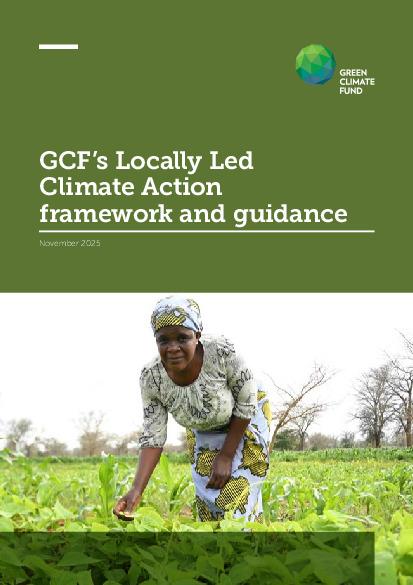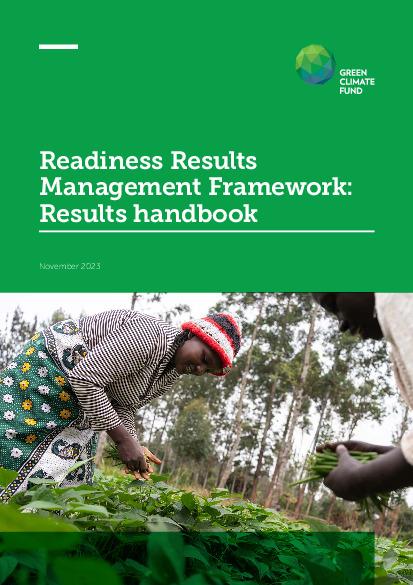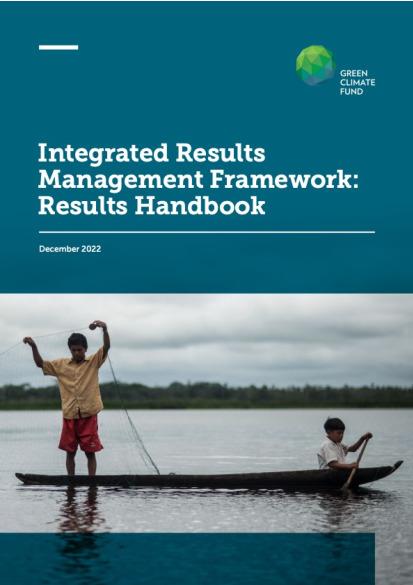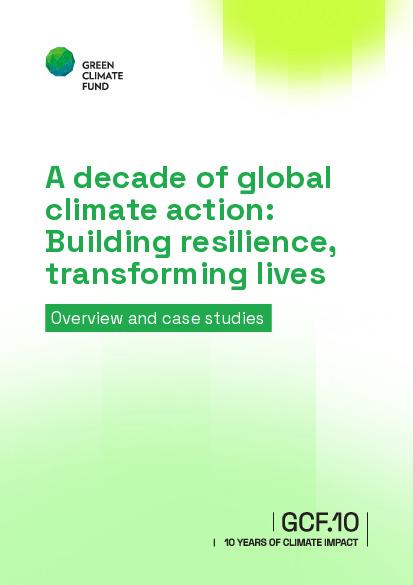Publications
The Green Climate Fund issues a range of publications for our direct and indirect stakeholders on a diversity of issues – for the general public to industry experts. Stay in tune with our mission and activities around the planet with the issues that speak to you.
Featured publications
GCF.10 Impact Report: Overview
A decade of global climate action: Building resilience, transforming lives
Read moreGCF’s Locally Led Climate Action framework and guidance
This document elaborates guidance on advancing good locally led practices through GCF modalities. Part 1 introduces GCF’s parameters and approach to devolution in the GCF business model and elaborates approaches for context-specific models. Part 2 provides step-by-step guidance for developing and structuring funding proposals in alignment with the parameters. A set of annexes cover Readiness, local, traditional and Indigenous knowledge, a related checklist and relevant examples from GCF portfolio.
Read moreCountry platforms for climate finance
This brochure describes GCF’s approach to country platforms, including an overview of the concept, the potential impact and the end-to-end support GCF can provide.
Read moreClimate investment planning and mobilization framework
The Green Climate Fund (GCF) and the NDC Partnership proudly launched the Climate Investment Planning and Mobilization Framework (Framework) to support countries in achieving national climate action. It aims to provide a common reference point fo
Read moreAnnual Progress Report 2024
This report describes the progress made by GCF to accelerate climate action for and by developing countries.
Read more
GCF’s Locally Led Climate Action framework and guidance
November 2025
GCF’s Locally Led Climate Action framework and guidance seeks to align the GCF, countries, accredited and executing entities, and partners on good locally led practices under existing access and funding modalities. Part 1 outlines GCF’s three parameters for locally led action: devolved decision-making and finance, local ownership and implementation, and sustainable local capacities. It elaborates approaches for developing context-specific financing and delivery models, explains how to approach...

GCF Water Project Design Guidelines - Part 1
May 2025
GCF Water Project Design Guidelines Part 1: Practical guidelines for designing water-climate resilient projects The GCF Water Project Design Guidelines provide a structured and programmatic approach to developing climate-resilient water projects. For water security projects for climate resilience, GCF uses innovative financing mechanisms to cover key domains such as water conservation, efficiency and reuse, hydrological observation, early warning and risk assessment, integrated water...

GCF Water Project Design Guidelines - Part 2
May 2025
GCF Water Project Design Guidelines Part 2: Applications of the practical guidelines for designing water-climate resilient projects in IWRM, CR-WASH, and drought and flood management The GCF Water Project Design Guidelines provide a structured and programmatic approach to developing climate-resilient water projects. For water security projects for climate resilience, GCF uses innovative financing mechanisms to cover key domains such as water conservation, efficiency and reuse, hydrological...

GCF Water Project Design Guidelines - Part 3
May 2025
GCF Water Project Design Guidelines Part 3: Practical guidelines for designing climate-resilient sanitation projects The GCF Water Project Design Guidelines provide a structured and programmatic approach to developing climate-resilient water projects. For water security projects for climate resilience, GCF uses innovative financing mechanisms to cover key domains such as water conservation, efficiency and reuse, hydrological observation, early warning and risk assessment, integrated water...

Programming guidelines for the Simplified Approval Process
December 2023
The SAP Programming Guideline, a vital element of our extensive GCF documentation suite, equips stakeholders with essential insights into the SAP's key objectives, policies, and a range of tools. Grounded in the GCF Investment Framework, the guideline delineates the Investment Criteria and the Fund's impact goals. It aids project developers in determining whether the SAP is their optimal funding avenue, guiding them through the nuances of proposal preparation and providing detailed steps for...

Reporting guidelines for the Simplified Approval Process (SAP)
December 2023
This guideline document responds to decision B.32/05 made by the GCF Board to develop guidance and templates for the Accredited Entities (AEs) on building a results-based monitoring and reporting system, based on the GCF integrated results management framework to simplify the annual performance report requirements and templates and accelerate disbursements. In particular, the primary aim of this guideline is to assist AEs in accurately and efficiently completing the SAP Annual Performance...

Previous Readiness Result Management Framework
November 2023
The Readiness Result Management Framework (RRMF) is the primary tool to guide Readiness results-based interventions, and through which GCF tracks and measures the results of the Readiness Programme in a consistent and coherent manner. The purpose of the RRMF Results handbook is to provide targeted users, National Designated Authorities, Delivery Partners and the GCF Secretariat, with guidance on the application of GCF’s RRMF as well as to assist in undertaking their respective roles and...

Sexual Exploitation, Abuse and Harassment (SEAH) risk assessment guideline
June 2023
This tool is a guide to help the Secretariat, AEs and executing entities (EEs) understand SEAH and be able to assess the SEAH risks related to proposed projects in order to predict, mitigate and ideally prevent SEAH from occurring. The tool applies to all GCF-financed activities and to both public and private sector entities. It may be updated by GCF periodically, as required, in order to further incorporate good practice and lessons learned, and to mirror the evolution of GCF’s ESS standards.

SAP Technical Guidelines: Ecosystems and ecosystem services
February 2023
The publication provides technical guidance for the preparation of SAP proposals. The thematic area of ecosystems and ecosystem services encompasses all natural environments and the productive uses that are based on them. This can range from environments not directly impacted by human activities – for example, remote rainforests, alpine regions or coral reefs – to environments that are intensively managed – such as agricultural areas or managed forests for timber production. Given that there...

SAP Technical Guidelines: Transport
February 2023
The publication provides technical guidance for the preparation of SAP proposals. Although there is no one standard definition of the transport sector, it can be described as including all kinds of transportation, such as road, rail and maritime transport, and aviation. Please note that the English document is currently the most up to date version of the technical guideline. The French and Spanish translations are being reviewed and will be soon available for download.

SAP Technical Guidelines: Cities and climate change
February 2023
Traditionally, cities are defined as large human settlements, with no one standardized definition applied internationally. Frequently, national governments have criteria they use to define urban areas. These criteria can vary to include aspects such as administrative boundaries, living conditions or population density. Another approach is what is termed “urban agglomeration”, which considers the extent of an urban area, or sometimes, that of a built-up area, to identify a city’s boundaries....

SAP Technical Guidelines: Forests and land use
February 2023
This publication provides technical guidance for the preparation of SAP proposals. The thematic area of forest and land use encompasses forests and other multiple land-cover types where forests are a prominent component of the landscape. This can range from natural forests, where ecosystems are not directly impacted by human activities (e.g. primary forests) to more intensively transformed landscapes – such as secondary growth forests, degraded forest landscapes, agroforestry systems and trees...

SAP Technical Guidelines: REDD+
February 2023
This guidance has been developed to support GCF accredited entities (AEs) and national designated authorities (NDAs) in their preparation of concept notes and funding proposals under the simplified approval process for REDD+ (REDD+ SAP). Please note that the English document is currently the most up to date version of the technical guideline. The French and Spanish translations are being reviewed and will be soon available for download.

SAP Technical Guidelines: Energy efficiency for industry and appliances
February 2023
This publication provides technical guidance for the preparation of SAP proposals. Energy efficiency (EE) is the process of reducing the energy consumption of infrastructure, facilities, machines, devices, products, services, business processes, activities and transport. It can be thought of as the first fuel of a sustainable world and as such it has a key role in ensuring cost-effective energy transitions. Please note that the English document is currently the most up to date version of the...

SAP Technical Guidelines: Renewable energy
February 2023
This publication provides technical guidance for the preparation of SAP proposals. Renewable energy (RE) is produced using natural resources that are constantly replaced within the human timescale. Just as there are many natural sources of energy, there are many technologies that can help to harness RE sources. Solar photovoltaic (PV) is the most well- known, wind power is the most widespread and hydropower is one of the oldest. Other RE technologies harness geothermal energy, solid waste or...

SAP Technical Guidelines: Water security
February 2023
This publication provides technical guidance for the preparation of simplified approval process (SAP) proposals for water security projects. GCF defines the water sector as encompassing surface freshwater resources and groundwater, but not oceans. Since the water sector is interlinked with several other sectors, such as agriculture and ecosystems, it is necessary to delineate its scope. Thus, the emphasis in this technical guidance a is on four sub-sectors: Integrated water resources...

SAP Technical Guidelines: Agriculture and food security
February 2023
This publication provides technical guidance for the preparation of SAP proposals. The agriculture thematic area encompasses agricultural production, land-use change caused by agricultural production and the food system in general. Agricultural production covers crop production and livestock. In addition to agricultural production the food system includes all steps from “farm to fork”: post-harvest handling, storage, manufacturing, processing, transport, retailing, consumption and food loss and...

Simplified Approval Process (SAP) funding proposal preparation guidelines: A practical manual for the preparation of SAP proposals
December 2022
These guidelines have been developed to support GCF accredited entities (AEs) in the preparation of funding proposals under the simplified approval process (SAP) pilot scheme. This document provides general clarifications on the indicative content expected in a SAP funding proposal submitted to GCF. More specific SAP Technical Guidelines on the type of activities by sector have also been developed separately by the Secretariat. This document refers to policies approved by the GCF Board in...

GCF Appraisal Guidance: A comprehensive guide to the tools and due diligence processes used to review and assess concept notes and funding proposals
June 2022
This document is no longer available The GCF Programming Manual, the Appraisal Guidance along with some of its annexes have been removed from circulation. Updated guidance on Concept Notes and Funding Proposals is currently under development and will be provided when complete.

Draft results handbook
May 2022
Targeting accredited entities and executing entities as its primary audiences, the GCF’s results handbook aims to provide practical guidance on how to apply the IRMF for GCF-funded projects/programmes through funding proposal development, planning, monitoring, and reporting activities, as well as interim and final evaluations. The handbook defines each IRMF indicator and its measurement approaches with tools and reporting formats where applicable. As per the Board decision on the IRMF (...




